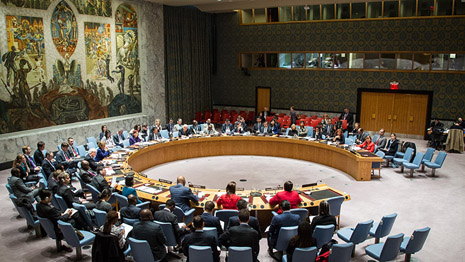UN Security Council meets over ISIS attacks on Syrian, Iraqi gays

"It`s about time -- 70 years after the creation of the UN -- that the fate of LGBT persons who fear for their lives around the world is taking center stage."
UN envoys were to hear accounts from Adnan, an Iraqi who fled northern Iraq after being targeted as gay and from a Syrian, Subhi Nahas, who escaped persecution and now works for a refugee organization in the United States.
In the ISIS-controlled regions, "gays are being tracked and killed all the time," said Nahas.
Gays in Idlib were targeted by the Syrian government, then by Al-Qaeda affiliate Al-Nusra Front after it took over the city in 2012 and finally by ISIS militants who seized control in 2014.
"At the executions, hundreds of townspeople including children cheered jubilantly as (if) at a wedding," Nahas recounted.
Adnan, an Iraqi who spoke by phone from an undisclosed location in the Middle East, said he had suffered brutality at the hands of Iraqi security forces before ISIS fighters showed up and feared his family could have turned him in to ISIS militants.
ISIS fighters "are professional when it comes to tracking gay people. They hunt them down one by one. When they capture people, they go through the person`s phone and contacts and Facebook friends," said Adnan, who used a false name out of fear for his safety.
"They are trying to track down every gay man. And it`s like dominoes. If one goes, the others will be taken down too," he said.
Since July 2014, the ISIS group has released at least seven videos or photos online that show the brutal executions of people accused of "sodomy," according to the International Gay and Lesbian Rights Commission.
Jessica Stern, the director of the commission, was also to address the meeting, hosted by the delegations from the United States and Chile.
The Syrian Observatory for Human Rights reported last month that ISIS fighters dropped two men from a building in the city of Palmyra and then stoned them to death.
In December, ISIS propagandists posted photographs showing militants throwing a man off a rooftop and then stoning him to death because he was gay.
Two men were stoned to death in Syria in November after declaring that they were gay.
The meeting was open to all United Nations member states interested in the plight of lesbian, gay, bisexual and transgender people.















































